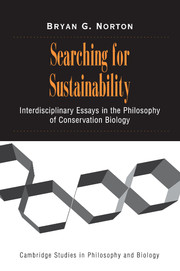Book contents
- Frontmatter
- Contents
- Searching for Sustainability
- General Introduction: An Interdisciplinary Experiment
- I PRAGMATISM AS AN ENVIRONMENTAL PHILOSOPHY
- II SCIENCE, POLICY, AND POLICY SCIENCE
- III ECONOMICS AND ENVIRONMENTAL SUSTAINABILITY
- 10 Sustainability, Human Welfare, and Ecosystem Health
- 11 Economists' Preferences and the Preferences of Economists
- 12 Evaluating Ecosystem States: Two Competing Paradigms
- 13 Sustainability: Ecological and Economic Perspectives, with Michael A. Toman
- 14 The Evolution of Preferences: Why ‘Sovereign’ Preferences May Not Lead to Sustainable Policies and What to Do about It, with Robert Constanza and Richard C. Bishop
- IV SCALING SUSTAINABILITY: ECOLOGY AS IF HUMANS MATTERED
- V SOME ELEMENTS OF A PHILOSOPHY OF SUSTAINABLE LIVING
- VI VALUING SUSTAINABILITY: TOWARD A MORE COMPREHENSIVE APPROACH TO ENVIRONMENTAL EVALUATION
- Index
- References
11 - Economists' Preferences and the Preferences of Economists
Published online by Cambridge University Press: 21 January 2010
- Frontmatter
- Contents
- Searching for Sustainability
- General Introduction: An Interdisciplinary Experiment
- I PRAGMATISM AS AN ENVIRONMENTAL PHILOSOPHY
- II SCIENCE, POLICY, AND POLICY SCIENCE
- III ECONOMICS AND ENVIRONMENTAL SUSTAINABILITY
- 10 Sustainability, Human Welfare, and Ecosystem Health
- 11 Economists' Preferences and the Preferences of Economists
- 12 Evaluating Ecosystem States: Two Competing Paradigms
- 13 Sustainability: Ecological and Economic Perspectives, with Michael A. Toman
- 14 The Evolution of Preferences: Why ‘Sovereign’ Preferences May Not Lead to Sustainable Policies and What to Do about It, with Robert Constanza and Richard C. Bishop
- IV SCALING SUSTAINABILITY: ECOLOGY AS IF HUMANS MATTERED
- V SOME ELEMENTS OF A PHILOSOPHY OF SUSTAINABLE LIVING
- VI VALUING SUSTAINABILITY: TOWARD A MORE COMPREHENSIVE APPROACH TO ENVIRONMENTAL EVALUATION
- Index
- References
Summary
INTRODUCTION
One of the most pressing practical problems in environmental policy analysis and formation is how to describe and measure environmental values. It would be an ideal outcome if the various disciplines – economics, ecology, philosophy, environmental health, and environmental chemistry, to mention some prominent ones – could speak about social values in a common evaluational vernacular. My experience in many interdisciplinary discussions is that, at present, no such common vernacular exists (Chapter 12, this volume).
One possibility, touted by economists and some other social scientists, is to use the notion of individual preferences as a universal descriptive term to characterise and eventually to measure the social values derived from protecting environmental quality, and the losses incurred when the environment is not protected. The purpose of this paper is to examine preferences as they are understood by economists and then to consider alternatives and/or additions to this conceptualisation of environmental values.
Economists define an individual's preference set as constituted by ‘all of the hypothetical exchanges the individual would be willing to make at various terms of trade’ (Silberberg, 1978, p. 4). Preferences are then understood as units of measure of the willingness of the individual to pay for a given outcome or (reversing the property ownership aspect) as a measure of the compensation an individual would require to give up some existing property right or privilege (see Freeman, 1993).
- Type
- Chapter
- Information
- Searching for SustainabilityInterdisciplinary Essays in the Philosophy of Conservation Biology, pp. 183 - 200Publisher: Cambridge University PressPrint publication year: 2002

